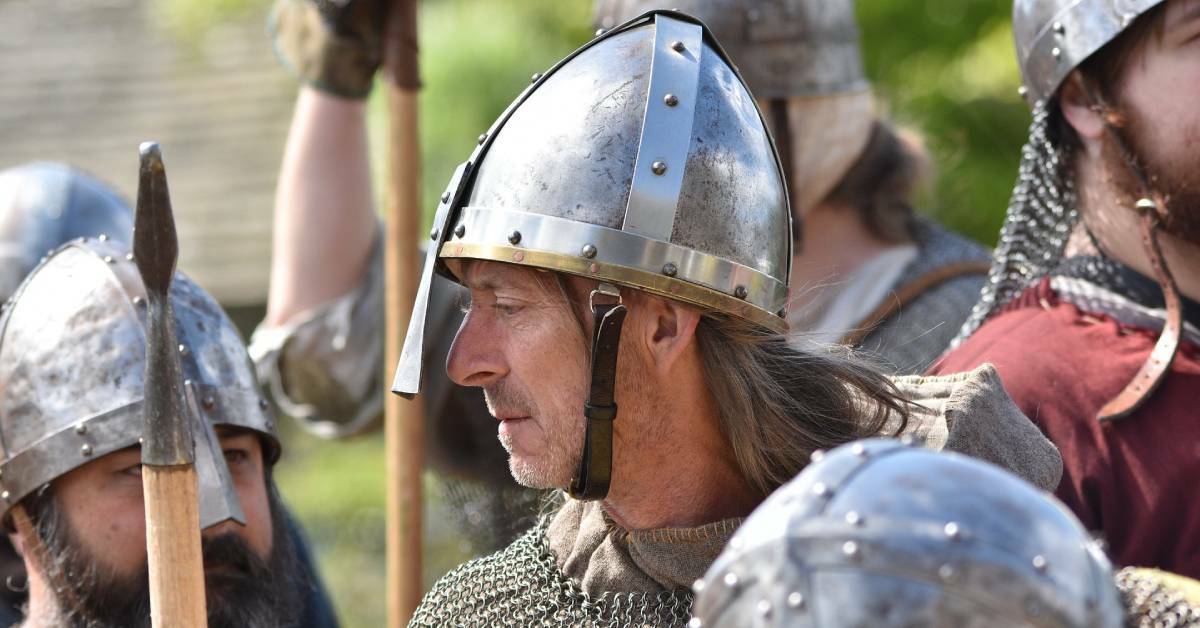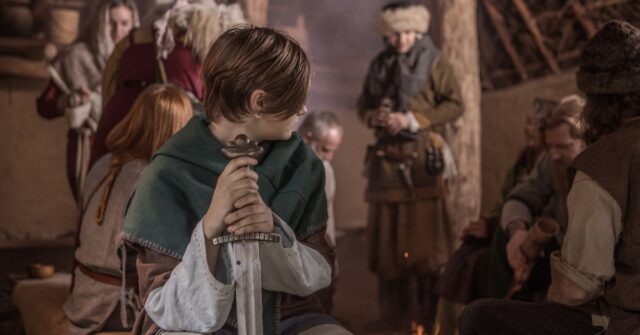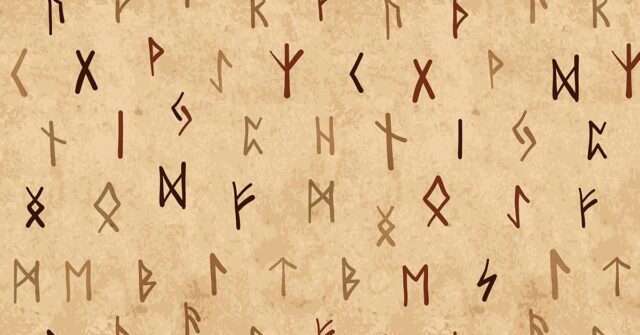The Viking Age is often characterized by the fierce and bold warriors who navigated the seas and waged war in search of riches and glory.
However, at the heart of Viking society was a deep-rooted sense of honour and reputation that influenced all aspects of their culture.
This article explores the importance of honour and reputation in Viking society, from its origins in Norse mythology to its influence on modern culture, and highlights the ways in which these values shaped the lives and actions of the Vikings.
Introduction to Viking Honor and Reputation
Before delving into the importance of honour and reputation in Viking society, it is crucial to understand what these concepts meant to the Vikings themselves.
Honor was a measure of a person’s worth, derived from their actions and achievements, while reputation was the public perception of their honour.
Both honour and reputation played a pivotal role in Viking society, impacting social status, relationships, and even legal matters.


Defining Honor and Reputation in Viking Culture
In Viking culture, honour was considered an intrinsic quality that could be gained or lost through one’s actions. It was closely tied to the ideas of courage, strength, loyalty, and adherence to societal norms and values.
Reputation, on the other hand, was the external perception of a person’s honor, shaped by their deeds and the opinions of others in the community.
A strong reputation could bring admiration, respect, and even fear, while a tarnished reputation could lead to disgrace and social ostracism.
The Role of Honor and Reputation in Viking Society
Honour and reputation played a significant role in the social hierarchy of Viking society. People with high honour and a strong reputation were more likely to hold positions of power, form alliances, and enjoy the respect of their peers.
These values also shaped everyday interactions, as people were expected to uphold their honour and protect their reputation in all aspects of their lives, including family relations, business dealings, and personal disputes.
The Origins of Viking Honor and Reputation
The concepts of honour and reputation in Viking society can be traced back to their mythological and historical roots.
Norse mythology, in particular, played a significant role in shaping the Vikings’ understanding of honour, while the historical context in which they lived also influenced their attitudes towards reputation and social standing.
Honour and Reputation in Norse Mythology
Norse mythology is replete with stories of gods and heroes who exemplify the virtues of honour and reputation. Characters such as Odin, the chief god, and Thor, the god of thunder, were admired for their bravery, wisdom, and strength.
These mythological figures provided a template for honourable behaviour, and their stories often contained moral lessons about the importance of upholding one’s honour and reputation.
Historical Influences on Viking Values
The historical context in which the Vikings lived also played a role in shaping their values.
As they expanded their territories through trade, raids, and conquests, the Vikings encountered various cultures and ideas that likely influenced their understanding of honour and reputation.
Additionally, the competitive and often violent nature of Viking society placed a premium on personal achievements, bravery, and martial prowess, further reinforcing the importance of honour and reputation.
Measuring Honor and Reputation in Viking Society
In Viking society, there were various ways in which a person’s honour and reputation could be measured. These included public recognition, personal achievements, and material wealth, among others.
Each of these factors contributed to an individual’s overall standing within the community and determined their ability to forge alliances, gain power, and enjoy the respect of their peers.
Public Recognition and Social Status
Public recognition was an essential factor in determining an individual’s honour and reputation in Viking society.
Those who were acknowledged for their courage, wisdom, or generosity often enjoyed higher social status and greater influence within their community.
Ceremonies, feasts, and other public gatherings provided opportunities for individuals to showcase their achievements and gain the recognition they sought.
Personal Achievements and Heroic Deeds
A person’s honor and reputation were also closely tied to their personal achievements and heroic deeds. Success on the battlefield, in trade, or in other pursuits could greatly enhance an individual’s standing within the community.
In many cases, these achievements were immortalized in stories, songs, and poems, ensuring that the memory of the individual’s accomplishments would endure and continue to bolster their reputation.
Material Wealth and Generosity
Material wealth was another important factor in determining honour and reputation in Viking society.
Those who possessed wealth were often seen as more powerful and influential, and their generosity in sharing their riches with others could further enhance their reputation.
It was not uncommon for wealthy individuals to host lavish feasts, sponsor the construction of important buildings, or support artists and craftsmen as a means of demonstrating their generosity and securing their place in the social hierarchy.
Honour and Reputation in Viking Law
The importance of honour and reputation in Viking society extended beyond social interactions and personal achievements, as these values were also enshrined in their legal system.
Laws were put in place to uphold honour, and disputes involving honour and reputation were often resolved through restitution, compensation, or even exile.


Legal Framework for Upholding Honor
The legal system in Viking society was designed to uphold and protect the honour of its members.
Laws were put in place to govern various aspects of life, including property rights, marriage, and inheritance, all of which had implications for an individual’s honour and reputation.
When disputes arose, the law provided a framework for resolving them in a manner that preserved the honour of those involved.
Restitution and Compensation in Disputes
In cases where an individual’s honour or reputation was damaged by the actions of another, restitution and compensation were often used to resolve the conflict.
This could involve the payment of fines or the exchange of goods, services, or even land to compensate for the harm done. In this way, the legal system sought to restore balance and maintain the honour of those involved in the dispute.
Outlawry and Exile as Punishments
In cases where an individual’s actions were deemed to be particularly dishonourable, they could face the punishment of outlawry or exile.
This was a severe penalty that involved the loss of all legal rights and protections, as well as the forfeiture of property and social standing.
By removing dishonourable individuals from the community, Viking society sought to protect its collective honour and reputation.
Viking Sagas and Poems: Reflections of Honor and Reputation
The importance of honour and reputation in Viking society is vividly illustrated in the sagas and poems that have survived from this period.
These literary works often focus on the deeds of heroes and the values they upheld, providing a window into the Viking worldview and the role that honor and reputation played in their lives.
Stories of Heroism and Valor
Viking sagas and poems are filled with stories of heroism and valor that showcase the importance of honour and reputation.
Characters such as Sigurd the Dragon Slayer and Egil Skallagrimsson are celebrated for their courage, skill, and adherence to the codes of honour that defined Viking society.
These stories served as both entertainment and moral instruction, reinforcing the values that underpinned the culture.
The Importance of Family and Lineage
Family and lineage were of paramount importance in Viking society, and the honour and reputation of an individual often had implications for their entire family.
Sagas and poems frequently emphasize the importance of upholding one’s family honour and avenging any slights or wrongs committed against one’s kin.
In this way, the literary tradition reinforced the idea that honour and reputation were not just personal concerns, but collective responsibilities that affected the entire community.
Examples of Honor and Reputation in Literature
Numerous examples can be found in Viking literature that highlight the significance of honour and reputation. In the Saga of the Volsungs, the hero Sigurd gains fame and honour by slaying the dragon Fafnir and avenging his father’s death.
In the Saga of Egil Skallagrimsson, the titular character demonstrates his honour and reputation through his prowess in both combat and poetry.
These and other stories serve as enduring reminders of the central role that honour and reputation played in the lives of the Vikings.
Honour and Reputation in Viking Warfare
Warfare was a defining aspect of Viking society, and the concepts of honour and reputation were deeply intertwined with the practices and customs associated with war.
From the motivation for raids and conquests to the rituals and symbols of honour on the battlefield, these values played a crucial role in shaping the Viking approach to warfare.
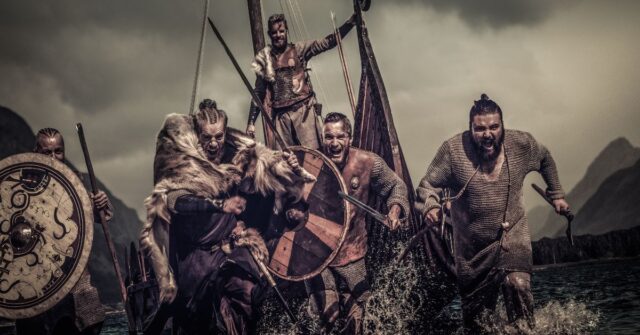

Honour and Glory on the Battlefield
Achieving honour and glory on the battlefield was a primary motivation for many Viking warriors.
Demonstrating courage, skill, and strength in combat could greatly enhance an individual’s reputation, both within their own community and among their enemies.
This desire for honour and glory often drove Viking warriors to undertake daring raids and conquests, expanding their territories and leaving a lasting impact on the world.
Reputation as a Motivator for Raids and Conquests
A strong reputation was not only a source of personal pride for Viking warriors but also a powerful motivator for their actions.
The fear and respect inspired by a warrior’s reputation could give them a psychological edge in battle, as enemies might be more likely to flee or surrender in the face of a renowned fighter.
This emphasis on reputation as a driving force for raids and conquests contributed to the widespread influence of the Vikings during their heyday.
Combat Rituals and Symbols of Honor
The Vikings had a number of combat rituals and symbols that were designed to demonstrate and uphold their honour on the battlefield.
These included the use of distinctive weapons and armour, the practice of ritualized duels known as holmgangs, and the display of banners and other symbols of allegiance.
By participating in these rituals and displaying these symbols, Viking warriors sought to prove their worth and maintain their honour in the eyes of their comrades and enemies alike.
The Role of Women in Upholding Honor and Reputation
Women played a significant role in maintaining and enhancing the honour and reputation of their families and communities in Viking society.
Their contributions included supporting their male relatives in their quests for honour, participating in warfare as warriors and shieldmaidens, and wielding influence in matters of marriage and alliances.
These various roles allowed women to actively contribute to the social fabric of Viking society and uphold the values of honour and reputation.
Women’s Contributions to Family Honor
In Viking society, women were responsible for managing the household and raising the next generation of warriors and leaders. By ensuring the success and prosperity of their families, women played a crucial role in upholding the family’s honour and reputation.
They were also often involved in resolving disputes and maintaining relationships within the community, further contributing to their family’s standing.
Female Warriors and Shieldmaidens
While less common than their male counterparts, some women in Viking society took up arms as warriors and shieldmaidens. These women fought alongside men in battles and raids, earning honour and reputation through their bravery and skill.
Historical and archaeological evidence has confirmed the existence of female warriors in Viking society, demonstrating the varied ways in which women could contribute to upholding honour and reputation.
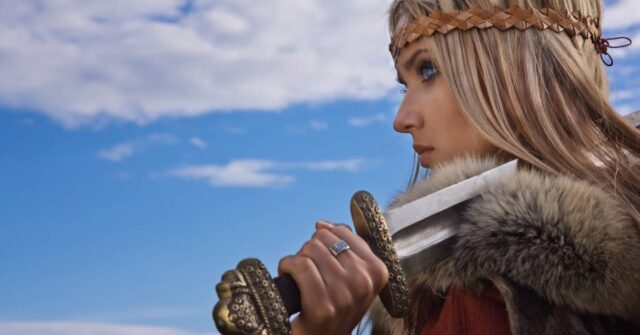

Women’s Influence on Marriage and Alliances
Marriage and alliances were essential aspects of Viking society, and women played a significant role in forging these connections.
By marrying into influential families or forming strategic alliances, women could enhance their own family’s honour and reputation.
In this way, women were active participants in the complex web of relationships that underpinned Viking society, and their contributions were crucial to maintaining the values of honour and reputation.
Legacy of Viking Honor and Reputation in Modern Culture
The importance of honour and reputation in Viking society has left a lasting legacy in modern culture, particularly in Scandinavia.
Contemporary Scandinavian societies still value the virtues of honour, loyalty, and courage, while the stories and legends of the Vikings continue to captivate audiences around the world.
Influence on Contemporary Scandinavian Society
The values of honour and reputation that were central to Viking society continue to influence modern Scandinavian culture.
Concepts such as “frith” (peace and social harmony) and “lagom” (balance and moderation) reflect the enduring impact of Viking values on contemporary Scandinavian society.
These values emphasize the importance of maintaining one’s honour and reputation through fair and honourable conduct, both in personal relationships and in broader social contexts.
Viking Honor and Reputation in Popular Culture
The fascination with Viking culture has led to a proliferation of books, films, television shows, and other forms of popular culture that explore the lives and values of these ancient warriors.
Often, these works emphasize the importance of honour and reputation, portraying characters who grapple with the challenges of upholding these values in a violent and often unforgiving world.
This continued interest in Viking culture demonstrates the enduring appeal of the concepts of honour and reputation.
Modern Revivals of Viking Values and Traditions
In recent years, there has been a resurgence of interest in Viking traditions and values, particularly among those who seek to reconnect with their cultural heritage.
Modern Viking reenactment groups, for example, often emphasize the importance of honour and reputation in their portrayal of Viking life.
Through these and other efforts, the legacy of Viking honour and reputation continues to be preserved and celebrated in the present day.


Conclusion: Honor and Reputation as Pillars of Viking Society
In conclusion, the importance of honour and reputation in Viking society cannot be overstated. These values influenced all aspects of life, from personal relationships to legal matters, warfare, and literature.
The enduring legacy of Viking honour and reputation can be seen in modern Scandinavian societies and the ongoing fascination with Viking culture around the world.
By understanding the central role of these values in Viking society, we can gain a deeper appreciation for the complex and sophisticated culture that thrived over a thousand years ago.

